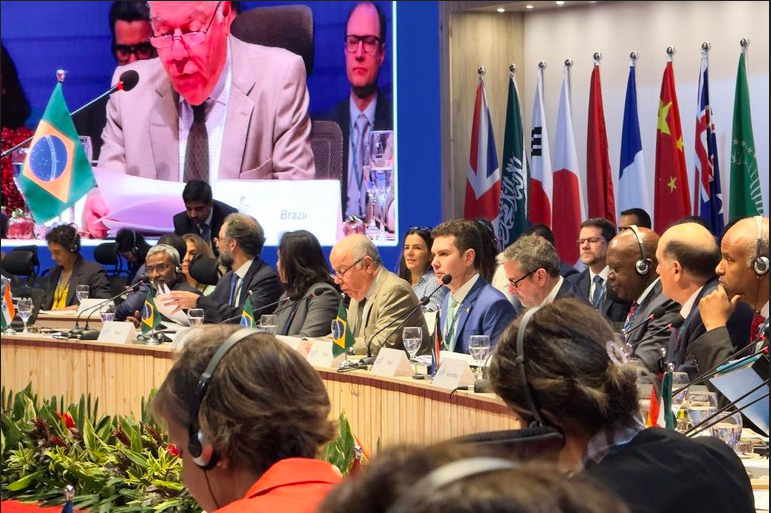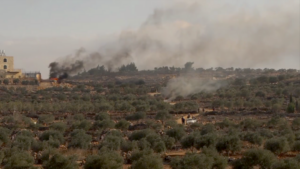
Published 23/07/2024 15:24 | Edited 23/07/2024 15:55
Although only 17% of the Sustainable Development Goals (SDGs) are expected to be achieved by 2030, the United Nations Development Programme (UNDP) continues to identify signs of positive change in the world through its “Signals Spotlight” reports. The second edition of the report was launched this Monday (22), in Rio de Janeiro, as part of the parallel programming of the G20 Development Ministerial Meeting.
The “Signals Spotlight” highlights the growing recognition of the need for alternatives to current economic models and the creation of forward-looking public bodies that move beyond the immediacy of electoral cycles. It also notes that the rights of nature are beginning to be recognized in constitutions, laws and corporate boards. In addition, there are promising advances in artificial intelligence, multilateral cooperation for space exploration and the provision of clean electricity. The report also points to greater political engagement and involvement in democracy.
Marcos Athias Neto, UNDP representative, said: “Hope for a better future has historically driven the development and progress of the humanities. If there were no hope, we would not be where we are now.” The launch of the report in Rio de Janeiro reinforces the role of the G20 as a global forum for dialogue and coordination on economic, social, development and international cooperation issues. The group brings together the 19 largest economies in the world, as well as the European Union and, more recently, the African Union.
Brazilian Presidency of the G20
Since December last year, Brazil has assumed the presidency of the G20, succeeding India. This is the first time that the country has assumed this position in the current format of the G20, established in 2008. At the end of the year, Rio de Janeiro will host the G20 Summit and the presidency of the group will be transferred to South Africa. Until then, several preparatory events are being held, including the G20 Development Ministerial Meeting, which began on Monday (22) and will run until Friday (26).
The “Signals Spotlight” is the result of analyses carried out by a network of more than 300 UNDP staff around the world, who continuously monitor emerging development trends and innovative ideas to address long-term global challenges. The work is aligned with the 2030 Agenda, which established the 17 SDGs undertaken by 193 UN member states in 2015.
The new edition of the report, available online, focuses on three central themes: opportunities for interspecies justice, responsible use of technology, and connected and resilient communities. The report also anticipates discussions on intergenerational equity, which are expected to be highlighted at the UN Future Summit, scheduled for September.
“The proliferation of conflicts, the acceleration of climate change and the polarization driving people apart make it easy to believe that the world is on a path of no return. But the ‘Signals Spotlight’ provides a new perspective, showing that the future is not predetermined – we live in a world of possibilities,” said a statement released by UNDP.
Development Ministerial Meeting
On July 22nd and 23rd, the Ministerial Development Meeting will take place at the Galpão da Cidadania in Rio de Janeiro, chaired by Minister Mauro Vieira (Foreign Affairs), with the presence of ministers such as Simone Tebet (Planning and Budget), Jader Filho (Cities) and Anielle Franco (Racial Equality). During the meeting, key issues such as reducing inequalities and access to water and sanitation will be discussed.
On July 24, the pre-launch of the Global Alliance against Hunger and Poverty will take place, with the participation of President Luiz Inácio Lula da Silva. The formation of the Alliance is an initiative of President Lula, presented at the G20 Summit in New Delhi last year. The Alliance will be formally launched in November, during the G20 Leaders’ Summit in Rio de Janeiro.
From July 23 to 26, the Employment Working Group will meet in Fortaleza to discuss the creation of quality jobs, gender equality and the promotion of diversity in the workplace. In Rio de Janeiro, representatives of the world’s largest economies will discuss the global economy, financing to combat the climate crisis and reform of the Multilateral Development Banks.
From July 22 to 26, the G20 side event “States of the Future” will bring together a global coalition to discuss state capabilities in the face of 21st century challenges, organized by BNDES and several ministries, with programming open to the public and meetings with civil society organizations.
Source: vermelho.org.br

